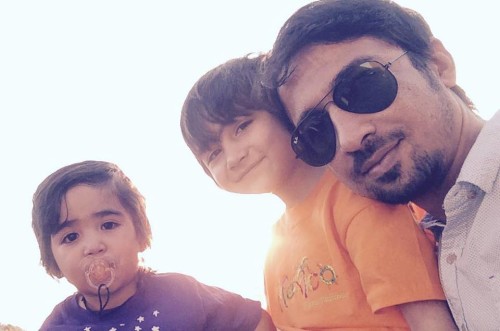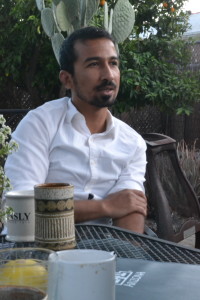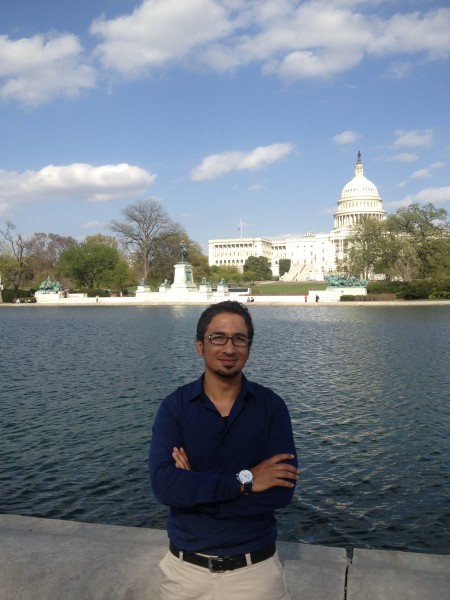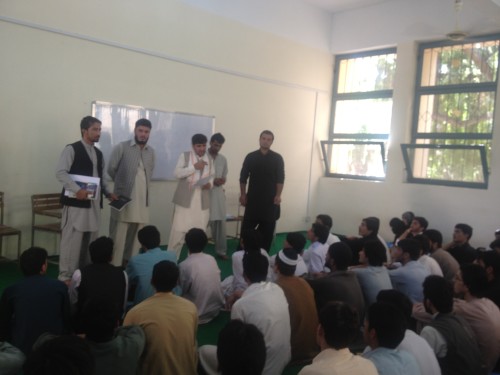
Noorullah Dawari and his family stood patiently in the checkout line at a Tucson Walmart when a white woman behind them snarled, proclaiming that there are too many of “them” in this country. Her words cut to the core.
There he stood with his wife their 2- and 6-year-old boys. The sadness was overwhelming.
A refugee forced from his home in Afghanistan for helping U.S. forces confronting the Taliban, Noor came to this desert town for his family’s safety and instead found hatred.
The family has seen this ugliness too many times since they arrived in Tucson earlier this year. His wife, a slender slip of a woman with long dark hair partially covered with a loose headscarf, is often the signal that says “different.” Drivers thrust middle fingers at the family from passing cars. Angry stares populate public places.

Noor, as he prefers to be called, is a man without a country, and now wonders if he can find it here.
His earliest memories are of carnage and war. Born in Kabul to the son of an Afghan colonel, he and his family moved often to flee the violence and bloodshed that ravaged Afghanistan for decades.
“It was normal for us. I haven’t ever seen anything other than war,” Noor said. He reminisces about the days where he and his boyhood friends collected bullet casings from the streets for toys. “We’d find hundreds all over and fill our pockets.”
It was not uncommon to see rotting carcasses and torn limbs in the streets where they played. Before the Taliban, the Mujahedeen ruled, led by ruthless, bickering warlords. Vivid images of death – countless headless bodies that would writhe on the ground seconds after beheadings – haunt his childhood memory.
When the Taliban took power and removed the Mujahedeen in 1996, he remembers the country feeling relieved.
“The Taliban were welcomed into Kabul with flowers at first,” Noor explained. “My family was happy because everyone else was happy.”
Such feelings soured when the Taliban hanged a well-liked former Afghan president and imposed strict Islamic rule. Noor’s father left the military as authoritarian rule took hold.
The regime punished those who did not attend mosque. Noor was made to wear turbans and dress like the Taliban for school, and his tiny classroom held 180 students, all crammed together kneeling.
Noor’s father remained steadfast in his beliefs. “Never take part in any of these parties,” his father would say. Noor attended the public Taliban schools, but also took English classes independent of Taliban control.
In 2002, the United States invaded Afghanistan and Noor’s life changed. A friend introduced him to U.S. military personnel and suggested that he work as a translator for American forces.

He was still in high school when he began interpretive work for the U.S. military and, later, foreign journalists. He also used his computer skills to earn a job as a logistics administrator for Kellogg, Brown and Root.
Noor never took the job as a conscious effort against the Taliban; his family simply needed money. But the Taliban labeled him as a traitor and an American spy, regardless.
“They called us the eyes and ears of the Americans,” Noor said. He lived with the implications every single day.
His closest friend, Khayber, had the same job until the Taliban killed him. Another friend with a similar occupation was beheaded and left in the street. The Taliban decreed that anyone who came to take the body would also be beheaded. For the next decade, Noor lived under the same threat.
“These things really break you down,” he said. “I didn’t want the same life I had for my kids. I was always a target in Afghanistan.”
In 2009, he applied for a refugee visa to escape the country. Maggy Zanger, a professor for the University of Arizona School of Journalism, brought him to Tucson in 2013 for a three-month project with the Institute for War and Peace Reporting. He helped develop a journalism program for a university in Afghanistan. He also assisted in completing a Pashto dictionary at the University of Arizona library, adding about 1,000 words.
Twice he applied for a visa to remain in Tucson. Twice he was rejected. Eventually, after resubmitting paperwork, Noor was granted the visa.

He returned home for a short period, finished his undergraduate degree and began applying for visas so his wife and children also could leave the country. All the while, he continued to work – now with young prospective journalists in Afghanistan.
“I wasn’t happy to come to the U.S. But I had to. I miss my life back home, but there’s no security for my family,” Noor said. “Life was horrible in Afghanistan.”
But here in the United States, Noor and his family are still unable to find peace.
“I didn’t expect a lot of racism here. There is racism in Afghanistan. But I was looking at my country as a Third World country and people aren’t educated. Americans are educated,” he said.
Noor strives to shelter his family from the hatred, often lying about what he hears being said that his wife does not understand.
During her stressful years in Afghanistan, Noor’s wife developed epilepsy. Through medication and doctors’ care, she overcame it. However, the stress and problems the family face here have caused it to appear again.
He tries to remedy such problems as best as he can, looking for small comforts in Tucson to calm the family’s nerves. Most weekends he brings them to the University of Arizona mall, where his children run and play in the grass. He and his wife watch from the shade. This is one of the few places he feels truly safe. From war. From the painful racism.
Finding work proved to be a problem. With a bachelor’s degree in political science, 10 years of experience working for the military and a résumé packed full of qualifications, he could only land a job working the night shift at a grocery store.
“I will never say I’m overqualified. I will do anything to pay the bills for my family,” Noor said.
However, for someone who sacrificed and risked his life for the United States, it does not seem quite so farfetched to suggest that he deserves more.
“I try to stay positive because of the good people I know here,” he says.
Noor does not foresee a bright future for Afghanistan and believes the country will always be at war. But he’s also unsure of whether he will ever be accepted in America either.
“I’m not wanted here, and I’m not wanted in my home,” he said. “I don’t know where I should go.”
Mihdi Afnan is a reporter for Arizona Sonora News, a service from the School of Journalism with the University of Arizona. Contact him at [email protected].
Click here for high-resolution photos.


